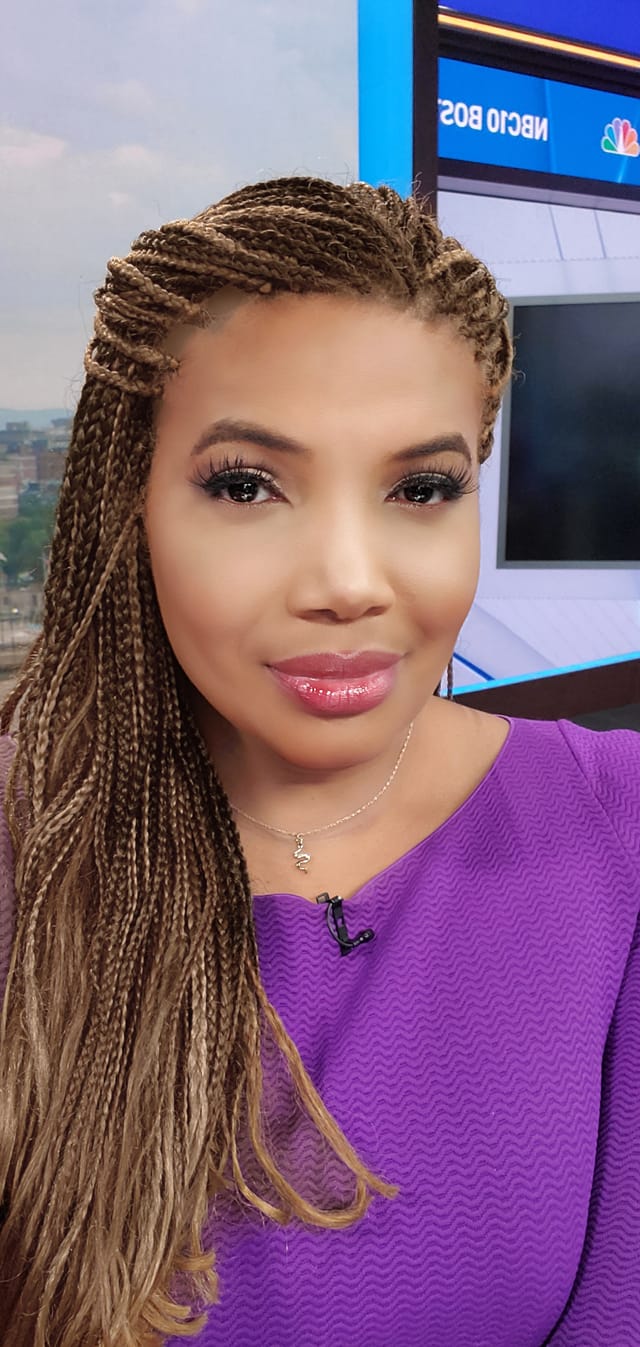Progress on Black Women’s Choices, but . . .
Homepage photo: Latoyia Edwards
Support Journal-ismsHAIR FREEDOM❣ Big Thank You to @NBC10Boston, Parent Company @NBCUniversal and You our Viewers for supporting my decision to wear my hair in braids anchoring 4-7am here in my My beloved hometown Boston. Our station is the 1st to do it, committed to reflecting all of our City? pic.twitter.com/hrXdVqkKK5
— Latoyia Edwards NBC10 Boston (@LatoyNBCBoston) July 29, 2021
Progress on Black Women’s Choices, but . . .
On the morning of July 29, Latoyia Edwards posted on social media pages:
“HAIR FREEDOM

“I want to thank NBC10 Boston for supporting my decision to be my authentic self and wear braids while anchoring Monday Thru Friday 4-7am. My station and our parent company NBCUniversal are committed to showing representation of all people in our audience. I don’t know how long I will keep the braids. It’s nice to have the choice.”
That evening, our Zoom Journal-isms Roundtable found that, surprisingly, the way Black women wear their hair on television would lead to the most animated conversation of the evening.
That’s despite changes in attitudes in management that we might not have known about.
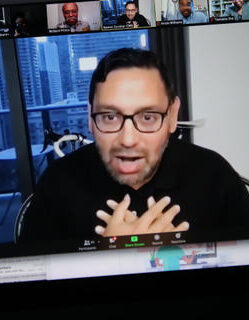 Ramon Escobar (pictured), senior vice president for talent recruitment & development at CNN Worldwide, declared that at his network, “if people want to wear their hair naturally, that’s who they are, and that’s, you know, an expression of their authentic self. We have been very, very clear about this at our organization.”
Ramon Escobar (pictured), senior vice president for talent recruitment & development at CNN Worldwide, declared that at his network, “if people want to wear their hair naturally, that’s who they are, and that’s, you know, an expression of their authentic self. We have been very, very clear about this at our organization.”
CNN even “worked hard, also, to get some folks behind the scenes on the hair and makeup team. If you’re going to be diverse, you should be diverse in every area.”
It became obvious that the hair issue can highlight differences between men and women, between managers who want ratings and advertising dollars and on-air personalities who are pushing for their personal freedom. And of course, there are cultural divides, racial and otherwise.
Members of the viewing audience weren’t in on the discussion, but they can vote with their remotes. One Black woman privately wrote Journal-isms, speaking of a Black female anchor who has been changing hairstyles at a rapid clip, that there should be limits.
“I like some of the women [where the hair] looks neat, cut short and some braids.” But this woman’s “were ridiculous, and I don’t know who told her they were [acceptable]. They were all different colors and just a bad look. She needs to go back to her curly wig. What I don’t understand [is] they are making a lot of money and can invest in a great wig natural or not!!”
The hair issue wasn’t the only topic at the Zoom Journal-isms Roundtable, nor was the Zoom the only place the discussion was taking place.
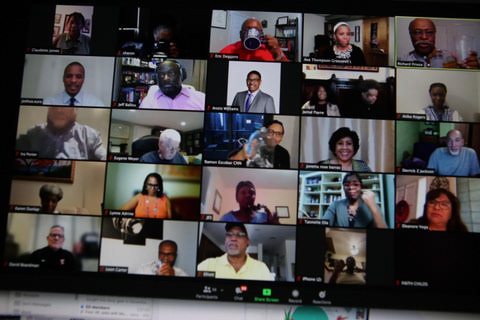
Seventy-two people were on the call, with another 204 watching on Facebook. The following week, at the Association for Education in Journalism and Mass Communication’s virtual convention, Ph.D. student Robert Richardson of the University of Texas-Austin School of Journalism and Media presented a paper on “The Hair Dilemma of Black Female Broadcasters,” and two days later, the city council in Jackson, Miss., unanimously voted to support the Crown Act, which would prohibit race-based hair discrimination in the workplace and schools. The Crown Act is currently law in 13 states.
You can watch the recording on YouTube at < https://bit.ly/3iyyitC >
The Roundtable also heard from Rashida Jones, who was named president of MSNBC last December, the first African American in that role at a mainstream television network, Northwestern University journalism professor Ava Thompson Greenwell, author of the new “Ladies Leading: The Black Women Who Control Television News,” and Pulitzer Prize winner Tamara Payne and her brother Jamal Payne, who are celebrating the honor accorded the book written by their late dad, Les Payne, with Tamara, “The Dead Are Arising: The Life of Malcolm X.”
We also discussed diversity among investigative reporters, prompted by the election of Mark Walker, a Black journalist at The New York Times, as board president of Investigative Reporters & Editors. Walker had an emergency and could not be present, but his IRE colleagues continued with the discussion. They were joined by David Boardman, dean of the Klein College of Media and Communication at Temple University, who has just announced creation of the Logan Center for Urban Investigative Reporting.
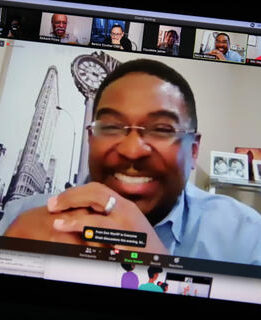 The hair conversation was ignited by what Anzio Williams (pictured), senior vice president, diversity, equity and inclusion for NBC Owned Stations, called an “explosion” of Black women in television news management. He asked whether that meant a “new kind of freedom” for them. After Jones’ appointment, Kim Godwin was named president of ABC News.
The hair conversation was ignited by what Anzio Williams (pictured), senior vice president, diversity, equity and inclusion for NBC Owned Stations, called an “explosion” of Black women in television news management. He asked whether that meant a “new kind of freedom” for them. After Jones’ appointment, Kim Godwin was named president of ABC News.
Greenwell (pictured below) said she wouldn’t use the word “explosion,” but noted that straightened hair for Black women is no longer the only acceptable style. “The fact that we are moving in that direction, as slow as it is, is a positive about people’s identity and how they can really bring their true selves to work every day.”
Williams, Escobar and Josh Eure, vice president of live programming at Black News Channel, agreed, but Williams and Eure argued for consistency.
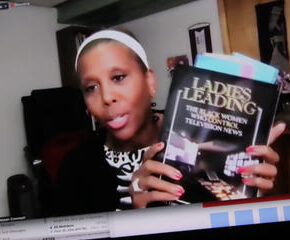 “Having been the person that’s spent . . . close to $200,000 on a [promotional] campaign, only for the anchor to come back the next day . . .– now she’s on billboards, buses and you know, bus stops, you name it — and then she decided she was going to cut it off and go Halle Berry,” Williams said.
“Having been the person that’s spent . . . close to $200,000 on a [promotional] campaign, only for the anchor to come back the next day . . .– now she’s on billboards, buses and you know, bus stops, you name it — and then she decided she was going to cut it off and go Halle Berry,” Williams said.
Williams told of job applicants’ highlight reels “where they may have . . . five or six different hairstyles. I’ve sat in the room with white men who are responsible for hiring, and I’ll say, ‘here’s somebody’ and they think it’s a different person.
“That’s why I tell people, you know, listen, do what you gotta do, so you can do what you want to do.”
Williams and Eure received pushback from women and some men.
“I’m a print journalist and I am baffled by the idea that the white audiences most stations cater to can’t be coached into understanding changing hairstyles,” said Nichelle Smith, enterprise editor for racism and history at USA Today.
“Sometimes your hair has a mind of its own,” said Tannette Elie, a journalism lecturer at the University of Wisconsin – Parkside, and vice president – associate of the Wisconsin Black Media Association, “and some days you may get up, and I know this happens to me, and I’m like — whoa! — you know I can’t get those curls to, you know, hold the shape that they had yesterday . . . so I look totally different, so sometimes going to a wig, or even straightening it . . . sometimes it’s difficult to be consistent, once you make that choice to be natural.”
Atiba Rogers, a freelancer who has written for Popsugar and other outlets, wrote in the chat room, “The topic about black women’s hair is one of the major reasons why I had to switch my journalism track from broadcast to multimedia.”
Eric Deggans, television critic at NPR, told the group it was important for people in positions of power to challenge conventions. “Part of what we need to do is educate the audience that, you know, there may be this Black woman who’s featured in a campaign, but guess what, her hairstyle might be different next week. . . . I think we have to be more open to . . . letting the talent present themselves the way they feel they need to.”
In May, John Oliver discussed the importance of Black hair on his HBO show, “Last Week Tonight with John Oliver,” including the ways it can be a target of discrimination, and offered some ideas to address that. (Credit: YouTube)
CNN and MSNBC are each making strides toward more diversity, according to Escobar and Jones. “You know that 40 percent basically of all our correspondents are people of color,” Escobar said. “I think it’s the most of any network.” But, he said, “the real emphasis, for us, has been behind the scenes . . . whether it’s you know, VP and executive producers and senior producers and everyone down to PA,” production assistants. He cited a “run on Black managers,” who are sought after, “the best problem in the world to have.”
And so CNN is trying to grow them, he said. Escobar also noted that CNN is looking to hire 450 people in the next six to nine months to support CNN Plus, its new streaming service.
After the killings of Asian American women in Atlanta this year, CNN spotlighted its Asian American journalists. “That really was organic because it came from our Asian talent,” Escobar said. “They sent a lot of notes to me about this, and they were, in particular, they were proud of the fact that we now, we had so many folks who understood the story in a different and profound way.”
At MSNBC, the organization is trying to fulfill a goal outlined last year by NBCUniversal News Group Chairman Cesar Conde. Conde wants a 50 percent diverse work force across his division — “50 percent women, 50 people of color, it’s both,” Jones said. “We’re somewhere around 47, 46 percent of new hires fitting that metric.”
She also said MSNBC is “the network with . . . more African Americans watching, more people of Hispanic background watching, more people of Asian American background watching, so we’re not specifically programming towards one ideology. We’re programming towards the individuality of our talent.”
Jones was responding to a question from Adam Powell, a former news manager now at the USC Annenberg Center on Communication Leadership and Policy, who told Jones, “What I hear is that MSNBC is basically comfort food for white liberals.”
Jones also said she is especially proud of the increase in the number of women of color in executive producer roles. “Maybe two additional in the last couple of weeks, with more opportunities to come.” Jones added, “We’ve also supersized our diversity, equity and inclusion team to focus on how do we create a pipeline to bring people up.”
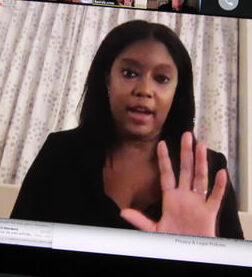 Jones (pictured) said she and Godwin had dinner two nights earlier to compare notes on their pioneering roles.
Jones (pictured) said she and Godwin had dinner two nights earlier to compare notes on their pioneering roles.
Asked what surprised her the most about being MSNBC president, Jones replied, “I have frankly been surprised by how our work collectively has preceded us, and I would say, rather than the challenge being convincing people that we deserve to be in the room, and that we deserve to be in the roles that we’re in, you get to a point in your career where people are convinced before you have to do the work.
“And I think I would say, both in my experience, and I think you know Kim would support this too, when you’ve had the legacy and the experience that . . . you’ve had, you come into some of these rooms and you . . . no longer have to convince people, like the title goes further than I think either one of us probably expected it to go.
“So that would be one piece of it, but it doesn’t mean the work is done.
“It just means that we don’t have necessarily the same kind of flexibility for missteps; we don’t have the same benefit of the doubt. . . . We already go into it realizing that, and so we know that . . . not only do we not have necessarily the same space or timeline to try to figure some things out, but the bigger thing is, I think we both realize everything that we do, everything that we say, is setting the stage and paving the road for the people who come up behind us.
“And I think that level of responsibility is different from folks who are in who are my peers, who are in similar roles.”
- Journal-isms: Why So Many Black Women Have Hair Stories (July 23)
- Journal-isms: Station: It Was About Policy, Not Hair: News Director Says Rhonda Lee Had Been Warned (Jan. 1, 2013)
- Journalist & Women Symposium: JAWS stands in solidarity with Brittany Noble Jones (Jan. 14, 2019)
- Melkorka Licea, New York Post: After years of discrimination, women embrace right to natural hair (July 8, 2019)
- Brittany Noble, medium.com: Why I disappeared from WJTV in Jackson, Mississippi. (Jan. 7, 2019)
- Patrice Peck, New York Times: Hiring, Firing, Setting the Culture: Black Women at the Top of TV News (July 10)
- Journal-isms: ‘Good Hair’ on the TV Set (Oct. 8, 2009)
- David Person with Melba Tolliver: The Afro: Personal Reflections (Jan. 1, 2005) (audio)
To subscribe at no cost, please send an email to journal-isms+subscribe@groups.io and say who you are.
Facebook users: “Like” “Richard Prince’s Journal-isms” on Facebook.
Follow Richard Prince on Twitter @princeeditor
Richard Prince’s Journal-isms originates from Washington. It began in print before most of us knew what the internet was, and it would like to be referred to as a “column.” Any views expressed in the column are those of the person or organization quoted and not those of any other entity. Send tips, comments and concerns to Richard Prince at journal-isms+owner@
View previous columns (after Feb. 13, 2016).
View previous columns (before Feb. 13, 2016)
- Diversity’s Greatest Hits, 2018 (Jan. 4, 2019)
- Book Notes: Is Taking a Knee Really All That? (Dec. 20, 2018)
- Book Notes: Challenging ’45’ and Proudly Telling the Story (Dec. 18, 2018)
- Book Notes: Get Down With the Legends! (Dec. 11, 2018)
- Journalist Richard Prince w/Joe Madison (Sirius XM, April 18, 2018) (podcast)
- Richard Prince (journalist) (Wikipedia entry)
- February 2018 Podcast: Richard “Dick” Prince on the need for newsroom diversity (Gabriel Greschler, Student Press Law Center, Feb. 26, 2018)
- Diversity’s Greatest Hits, 2017 — Where Will They Take Us in the Year Ahead?
- Book Notes: Best Sellers, Uncovered Treasures, Overlooked History (Dec. 19, 2017)
- An advocate for diversity in the media is still pressing for representation, (Courtland Milloy, Washington Post, Nov. 28, 2017)
- Morgan Global Journalism Review: Journal-isms Journeys On (Aug. 31, 2017)
- Diversity’s Greatest Hits, 2016
- Book Notes: 16 Writers Dish About ‘Chelle,’ the First Lady
- Book Notes: From Coretta to Barack, and in Search of the Godfather
- Journal-isms’ Richard Prince Wants Your Ideas (FishbowlDC, Feb. 26, 2016)
- “JOURNAL-ISMS” IS LATEST TO BEAR BRUNT OF INDUSTRY’S ECONOMIC WOES (Feb. 19, 2016)
- Richard Prince with Charlayne Hunter-Gault,“PBS NewsHour,” “What stagnant diversity means for America’s newsrooms” (Dec. 15, 2015)
- Book Notes: Journalists Follow Their Passions
- Book Notes: Journalists Who Rocked Their World
- Book Notes: Hands Up! Read This!
- Book Notes: New Cosby Bio Looks Like a Best-Seller
- Journo-diversity advocate turns attention to Ezra Klein project (Erik Wemple, Washington Post, March 5, 2014)
When you shop @AmazonSmile, Amazon will make a donation to Journal-Isms Inc. https://t.co/OFkE3Gu0eK
— Richard Prince (@princeeditor) March 16, 2018

